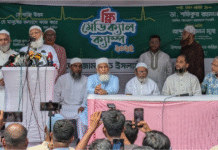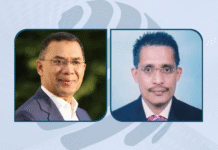Sadeq Khan
Aisha Gani, a British-Bangladeshi Contributor to the guardian.com recalled her mood in an article published 15 January 2014 when she visited Dhaka on the last Independence Day of Bangladesh (16 December, 2013): “I think about when I visited Bangladesh, navigating the dusty alleyways with Amna (her Bangladeshi cousin), hailing a rickshaw and picking up hot parathas and halwa en route to Dhanmondi lake to watch the sun rise. It was Victory day in Bangladesh.
But then she was faced with the reality of violent unrest prior to and during the one-sided January 5 polls, and plainly laid bare her shock and surprise: “My cousin Amna, a student at Anwer Khan Modern Medical College in Dhaka, is currently re-sitting her crucial exams and missed all her classes in the past two weeks because of the recent instability in Bangladesh. ‘My friends are afraid and nobody wants to come into college,’ she told me. It was not safe for her to travel back to the capital, with violent clashes between protesters and police on the streets, strikes and road blockades, and buses being petrol-bombed. ‘Bangladesh is very dangerous at the moment. People didn’t want to go out during election time. There is horror every day.’
Toxic political culture
“The Hasina regime’s record of human rights abuses and the level of corruption is serious, and it is disconcerting that pro-government newspapers and elite commentators overlook this. Moreover, their support for the Shahbag movement, whose demands include hanging those accused at the domestic war crimes tribunal, banning opposition political parties and arresting editors who are critical of them, is deeply disturbing. Although the Bangladeshi novelist Tahmima Anam argued in the Guardian that Bangladesh doesn’t have to go back to being a basket case, the only way to prevent this is to have a real democracy, stop the political point-scoring, stop seeking revenge, and focus on unity and working towards a more pluralist society.”
Her simple conclusion: The election has left “nothing to celebrate”, as the country is “being choked by a toxic political culture in which winner takes all, and where there is no room for reconciliation.”
She also makes a simple assessment of the trouble with Bangladesh as follows: “This was the most violent election day in Bangladesh’s history, with 21 people killed as they headed to the polls, and in the run-up to the elections there have been night raids on the homes of opposition supporters. Yet human rights abuses by the regime’s security forces are nothing new. Last year, the offices of human rights activists were ransacked for reporting on abuses by the government’s security forces against protesters, while activists Adilur Rahman Khan and Naseeruddin Elan of the Bangladeshi human rights group Odhikar were arrested and are now appearing before a cyber crimes tribunal. There have also been violent attacks on journalists, including the murder of a blogger. And it is the same government security forces that charged with batons and opened fire on protesters who were demanding compensation for the loss of their loved ones after the Rana Plaza factory tragedy, in which more than 1,100 people died. Much of the current instability is happening because Hasina slashed open some old wounds of the nation: the prime minister had made a manifesto pledge to hold accused ‘war criminals and collaborators (of Pakistan)’ on trial – despite a previous general amnesty in 1973 which had been granted by Hasina’s father, Sheik Mujibur Rahman.
Scandals mar trial
“(The trial) has been marred by scandals including the abduction of defence witnesses by police from the court, to the exposure of partiality and collusion between judges, prosecution and the state. Are these shackles of war and political grudges what we want the next generation of Bangladeshis to inherit? Grave crimes were committed and have to be addressed. There has to be restorative justice for the victims of the war, and ….. there can (also) be truth and reconciliation even after 40 years. But has justice (at all) been done with unfair trials, division and more spilt blood?”
Her last question appears to have been answered on February 23 by the incident of a daring daylight ambush by masked men on a prison van on its way to court carrying three condemned Jamiatul Mujahedin Bangladesh (JMB) convicts in Trishal, Mymensingh, and their successful getaway freeing the prisoners, leaving one policeman dead and two injured. Of the three, two on death row and one serving life term, one death row convict was tracked down in Sakhipur, Tangail, and apprehended the same afternoon within six hours from his escape. But police claims he was taken with them in their search for other escapees in Beltoli Ceramic area of Sakhipur and was killed in crossfire as JMB militants rebuffed the police-raid by gunfight and escaped again. It is not clear why the recaptured prisoner had to be taken along to pursue other fugitives. None of the masked attackers or the two escaped convicts have been traced since.
Mystery of ambush
The security lapse in the ambush, the mystery of unidentified men behind it and the failure of the law-enforcement agents to track down the escaped prisoners have serious questions about the political will and capacity of the incumbent regime in containing criminality and combating real terror. It has been bent on politicising the entire police system and the security administration of the state to suppress legitimate dissent and harass political opposition, towards establishing a virtual one-party rule and a dynastic oligarchy. In the process, it neglected watch over regrouping and revival of the JMB men, who had surfaced in the first place during the earlier Sheikh Hasina regime in the late nineties propagating the virtues of Sharia justice system for the common man, who is deprived of any relief for legitimate grievances by existing judges and costly judicial system in which justice is both denied and delayed, bought and sold through brokers and influence peddlars.
The Opposition BNP leaders are loud with suggestions that JMB was knowingly or unknowingly indulged in the first place by the 1996-2001 Awami League government; that top leaders of JMB had family connections with influential Awami League leaders who gave them business to build up adequate capital for their ill-conceived mission; and that it was the 2001-2006 BNP government that began to be dangerously disturbed by JMB, took steps to bring JMB leaders to book, and successfully halted JMB onslaught. The military-backed caretaker regime had practically rooted out JMB thereafter.
JMB’s regrouping
The Trishal incident presumably indicates that under the current Awami League regime, the JMB may have been secretly indulged to regroup again, while the government leaders cried wolf about BNP-Jamaat-Shibir terror, often parroted by men belonging to the security administration. Now that the “wolf” has made an appearance, they have no clue how to meet that terror or where to look for its den. Suspicions are also being voiced about the killing of the recaptured JMB convict in crossfire. In the atmosphere of utter distrust of the police and the administration amongst the public, it is only natural that many think the crossfire victim was “silenced” lest he would reveal collusion from within the administration in the escape plan.
As long as the ruling circle goes on employing the state machinery and the law-enforcement agents to bark up the wrong tree and to hang the dog by giving it a bad name, the real wolf would continue to escape detection and await its bid for a big prey.
Source: Weekly Holiday









